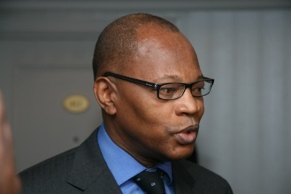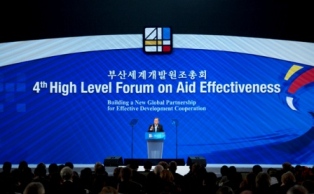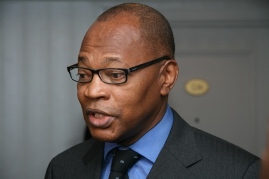INTERVIEW SPECIAL: Secretary General on aid effectiveness in ACP countries, North-South relations and South-South cooperation
 World leaders and decision makers gathered in Busan,South Korea last monthfor the 4th High Level Forum on Aid Effectiveness . More than 2000 delegates reviewedwhether global developmentaid is meeting its aims of growing economies and easing poverty, anddiscussed how to set a new agenda for aid. ACP Secretary General Dr Mohamed Ibn Chambas talked to Vice Versa magazine's Selma Zijlstra about the conference.
World leaders and decision makers gathered in Busan,South Korea last monthfor the 4th High Level Forum on Aid Effectiveness . More than 2000 delegates reviewedwhether global developmentaid is meeting its aims of growing economies and easing poverty, anddiscussed how to set a new agenda for aid. ACP Secretary General Dr Mohamed Ibn Chambas talked to Vice Versa magazine's Selma Zijlstra about the conference.
Vice Versa: What is your impression of the 4th High Level Forum on Aid Effectiveness conference?
Secretary General: The High Level participation is encouraging. There is a real desire on both sides to move this discussion on achieving aid effectiveness forward. Now, we need to implement the commitments that are made here.
VV: Do you think Busan could make a step forward?
SG: That is the expectation. We can not move from one conference to another to rehearse the same issues. Next time there will be a review of the scorecard: what have we done differently, and how we have achieved alignment with national programmes, to what extent is ownership and mutual accountability attained? How effective is coordination and how reliable is funding? This questions will be asked.
VV: Some people say the Busan Outcome Document is too weak, do you share that feeling?
SG: There will never be a perfect document. There is a feeling that the language is not that binding. But even if you have a stronger document, ultimately, it is the implementation that counts. We can sit here for another week and come up with different wordings and paragraphs. However, it is not so much the wordings of the document, as the intention of governments and the results on the ground that are important.
VV: In the statement of the ACP, it is stated that donor governments have particularly failed to implement principles on ownership and alignment. Can you explain why that is so important?
SG: ACP countries include most of the Low Income Countries, small islands and most of the fragile states. By definition, they are constrained by their capacity and their smallness. It poses real difficulties when there is an overlap of partners and programmes, especially when they are not situated in the countries’ own national development plans and context. So, it becomes particularly of interest to ensure that these principles of ownership and aligment are taken seriously.
VV: Could you give an example?
SG: Take, for example, Tuvalu. It is a country with less than a million people and a poor country. It has a small ministry. There are so many partners and Tuvalu has to write so many different reports, that the ministry of finance and planning will have to spend all year just to complete the reports. So, how can they go into the field and implement all the beauitful programmes? This poses real problems. Also, the fragile states have serious capacity problems. Here in Busan, state after state indicated that they have serious capacity constraints. You cannot impose very tedious procedures and heavy requirements on them. But that is not always being taken into account by the donors.
VV: Have you been succesfull these days to explain that?
SG: A forum like this is a good place to address these issues. Everybody is agreeing to recognize national ownership, align the assistance, and coordinate better – at international and national level – even on the ground, at local level. The test is now to live through it. Everybody can say coordination is important, untill you start – and then suddenly people are making objections. Some cite national rules and national legistlation, others parliamentary oversight…
VV: And what, from the partner country side, should be improved?
SG: There is the issue of accountability towards national citizens, transparency, and putting resources to priority sectors, such as education, health and human capacity development. Developing countries need to address governance and instituationl problems. They also have to realize that whether a country develops or not, will largely depend on its own effort and what their own citizens are able to do. Development countries need to make their people lead the process, train them and give them education.
VV: What about South South cooperation? Do you think South South cooperation is the next promise for development cooperation?
SG: We appreciate South South Cooperation. It complements traditional North-South relations. It is perhaps the best form of lessons learned, when we learn about other developing countries’ experiences. For example, we have come here to Korea. They have developed themselves over the last 50 years. Once, they were an aid recipient. Today, they are an aid giver. It makes us realize that it can be done. That is an inspiration. South-South cooperation is not either/or, but a welcome addition to traditional aid.
VV: How do you see the role of China?
SG: The whole world sees China as another miracle. It is now a major global economic player and the country is crucial for the economic revival in the North. In developing countries, it has also played an important role to address the infrastrucutre gap. When it comes to the development of infrastructural projects, such as ports, railways, and telecom, China can bring additional support. That is very welcome, because that remains an area which has not been addressed and has constrained growth. Yet, sometimes I think their role is overplayed. The European Union remains the largest partner to the ACP countries, China’s trade with Africa is 100 billion, which is still just 10 % of their trade, and their investment is only 4 % of total investment overseas. So the numbers are not that overwhelming.
VV: Why then is everybody talking about it?
SG: They see it as something new. China’s economic impact in Africa is new and that grabs the attention.
VV: Do you want China adhere to the Paris and Accra principles?
SG: China has a cooperation framework with Africa and many of the ACP countries. Surely it would be good if it would participate in the aid effectiveness movement. But most of Chinese support is not necessarily in aid, it is in investment. So it is a different framework.
VV: The discourse is now that aid has a minor role to play in development. When you look at post MDG framework, do you have idea how that should look like?
SG: The emphasis should be on production, more trade, better government structures, and an expansion of agriculture and agro industry. Also, we have to continue emphasis on gender equality, as it is such a cross cutting issue. It addresses agriculture, nutrition, health, sanitation at the same time.
VV: People here in Busan talk a lot about aid as as catalyst for development. How do you see that?
SG: Aid should lead a country in a situation where they do not need aid anymore. Aid should help a country to stand on its feet. Developing countries should strategize how effectively use what they are getting in resources. Aid can help build their capacities to harness their domestic resources.
VV: You mention trade as something important. What do you think donors should improve, e.g. in their trade politices?
SG: This argument was best made by president Meles Zenawi of Ethiopia. Sometimes we feel that what is being given with the right hand, is being taken away with the left hand. We talk about aid effectiveness and at the same time, we take measures regarding trade that make real access to markets difficult for African products. The Asian example teaches us that the most effective and sustainable way in fighting poverty is through trade led growth.. If Africa is to fight poverty on a sustainable basis, we have to grow our eocnomies, trade more, amongst ourselves, and also be better integrated into global markets. We therefore have to see real progress at the development round in the WTO and within the EU with the EPA’s. We should not insist too much on rapid liberalization and talk about reciprocity when we know that the North and South are not equal. They are just not there yet.
For example, Korea was given free market access by the USA for decades. And American companies invested heavily in Korea. That is part of the miracle. We want to see that traditional partners like Europe invest in our countries and remove tariff and non tariff barriers. That is in our mutual benefit. If the European Union invests in the ACP countries, that will be one of the countercyclical actions to come out of the current crisis. In the ACP countries, there are much resources, there is a young population. They should be seen as potential consumers – ofcourse they want the good thing in life. There would be a huge market to import BMW, Porsches, I-Phones, Rolex…
VV: It does not seem that the European Union is going to do that.
SG: That is the crux of the negotiations. We do not see progress in the Doha trade rounds. Now, we end up with ultimatums. But where is the cooperation, then? We need to be flexible at both sides to arrive at a concept that is mutually beneficial. We need to see real change: I think that will help in overcoming the financial cirisis, if the current growth, for instance, in Africa is maintained.
VV: Do you have good hopes something will change for the better for developing countries in the coming years?
SG: Let us hope that with the continuing global crisis, the food crisis which is not over yet, and the climate crisis, that all of us begin to realize that it should not be business as usual. Let us hope also that the crisis does not lead to an inward looking approach. That would be a wrong approach.
VV: Do you see that happening?
SG: There is a temptation that when there is crisis, people start building walls. But frankly that would be a counter-intuitive measure. We must take the crisis as an opportunity and strenghten partnerships, instead. And realize when there is growth in developing countries, it means that there are markets for developed countries. That investment in developing countries can be a major stimulus for continued economic growth in the North.
– Original transcript of interview first published in Dutch by Vice Versa Online
See also: ACP Group calls for better donor coordination, abolition of aid conditionalities
**
